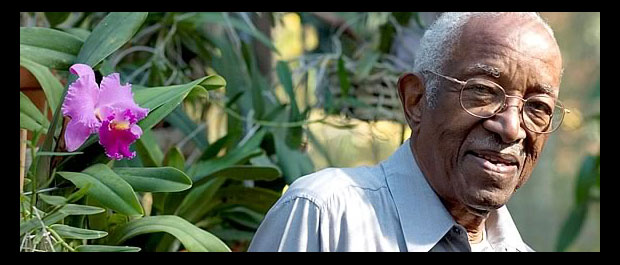John Hope Franklin, who died March 25 at the age of ninety-four, was a hero to me, a cherished mentor and colleague—but, above all, a person who exemplified what it means to marry scholarship to a passion for justice. John Hope (as he liked to be called) lived through the tragedy of racial oppression that ruled America for most of the twentieth century. Born in 1915, he witnessed the infamous Tulsa race riot of 1921, when arsonists burned down his father's law office.
Volunteering to serve his country in World War II as a soldier with all the skills implied by a graduate degree, he was told that the only position his country had for him was as a servant. "You're the wrong color," the recruitment officer said.
John Hope Franklin never accepted such treatment. Nothing disturbed him more than what happened to his brother, a school headmaster who was assigned only menial kitchen duties when he joined the U.S. Army in World War II, and who came home a broken man, driven to commit suicide shortly after being demobilized.

Addressing race relations with former President Bill Clinton at the New York Public Library in 2005, ©Peter Foley / epa / Corbis
But whatever his anger, John Hope never allowed resentment to hobble his determination to move forward. A proud graduate of Fisk University, then all-black, he moved on to Harvard University, like W.E.B. DuBois before him. (He first encountered Duke as a graduate student, when he conducted research in the manuscript department for his doctoral dissertation about free blacks in South Carolina. The library staff in the manuscript collection was happy to provide him the documents he requested. But the distinguished young scholar would have to go off campus if he wished to use the toilet or eat lunch.)
After completing his graduate work, he returned to Fisk for a brief teaching stint, and then moved to North Carolina with his wife, Aurelia, to teach at St. Augustine's College in Raleigh and North Carolina College for Negroes (now North Carolina Central University) in Durham.
He published books that earned him status, acclaim, and prestige. His most famous work, From Slavery to Freedom, published in 1947, transformed American scholarship by placing the story of African Americans at the heart of the nation's history. He quickly became a scholar of national and international fame. He left North Carolina in 1947 to teach at Howard University, then moved on to Brooklyn College and, later, the University of Chicago, breaking barriers everywhere he went: the first black person to give a paper at the Southern Historical Association, then the first black president of the Southern Historical Association, the Organization of American Historians, and the American Historical Association.
I first came to know John Hope Franklin as a friend at the National Humanities Center in Research Triangle Park, where we were both fellowship recipients, nearly thirty years ago. He came to my defense at a seminar when a group of conservative scholars attacked me for my support of affirmative action.
How wonderful, then, when Terry Sanford and the Duke history department persuaded this pivotal figure in American history to come here to complete his career. John Hope would return to his beloved Durham, where he could build a large greenhouse for his cherished collection of orchids, pursue his teaching in law, as well as history, and spend his last decades in the place he really considered home.
Students loved John Hope. Colleagues appreciated his wit and repartee. His course in constitutional law, taught with Walter Dellinger and William E. Leuchtenburg, won universal praise.

Serving as history department chair at University of Chicago, circa 1969, ©Condé Nast Archive / CORBIS
He received virtually every award a scholar could aspire to, along with the Presidential Medal of Freedom, the nation's highest civilian honor, in 1995—even as the reminders of abiding racism persisted: At a party at the Cosmos Club the evening before the award ceremony, a white woman approached, handed him her claim check, and asked him to retrieve her coat.
Although his cherished Aurelia had died in 1999, the new century brought moments of profound insight and gratification to John Hope's life. From the time he was a child, his mother had told him that whenever anyone asked him what he wanted to be when he grew up, he should say, "the first Negro President of the United States." So nothing could have been more appropriate or redeeming than John Hope Franklin's meeting with Barack Obama on the campaign trail and living to see him achieve the dream that John Hope thought never would be realized.
I last saw John Hope two days before he went to the hospital. He was physically weak, but intellectually alert and excited. We ate lunch together at a downtown restaurant. He knew that time was running out. Asked how he was, he replied, "I'm in transition." He was at peace.
An extraordinary life. An extraordinary gift to Duke and to Durham. He is still with us.
—Chafe, the Alice Mary Baldwin Professor of history, has been on Duke's faculty since 1971. He is the author of twelve books, including Civilities and Civil Rights, a seminal study of the sit-in movement, published in 1980.

Share your comments
Have an account?
Sign in to commentNo Account?
Email the editor